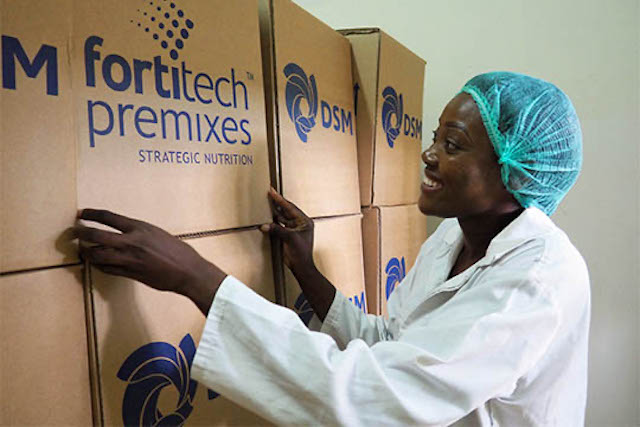Malawi’s Food Processors Make Progress on Nutrition
African food processors are combating malnutrition with support from food technologists and business advisors.
Editor’s note: This story originally appeared on the Feed the Future’s Medium channel.

In their processing plant in Lilongwe, Malawi, VALID Nutrition, a social impact enterprise, is combating malnutrition with a life-saving product: nutrient-rich, fortified peanut paste. Nearly half of all Malawian children are chronically malnourished, and they’re not alone. In Eastern and Southern Africa, 25 million, or 40 percent of children under the age of 5, suffer from chronic malnutrition.
VALID Nutrition is a leader in developing these ready-to-use therapeutic foods. Their goal is to make highly nutritious ready-to-use food products more accessible and affordable to those who need them most. As a growing business, the company is also eager to expand its operations and access new markets.
Food processing businesses like VALID Nutrition are critical players in countries where agriculture is at the heart of economic growth. They purchase locally-grown crops, produce affordable and nutritious food for local consumers, and create jobs for local workers. Africa’s food sector has enormous potential for growth: the region currently imports $50 billion of food and agricultural products every year, and the value of purchased food in East and Southern Africa is expected to increase seven-fold by 2040.
To meet that growing demand locally, food processing companies need customized technical and business support to increase their capacity, improve their operations, and maintain high product standards. That’s where Feed the Future is able to step in.
VALID Nutrition is one of more than 1,000 food processors in Ethiopia, Kenya, Malawi, Tanzania, and Zambia that benefited from Solutions for African Food Enterprises (SAFE). This Feed the Future partnership – implemented by the global nonprofit TechnoServe and nonprofit consortium Partners in Food Solutions and funded by USAID – provides tailored support to food processors by tapping into the expertise of employee volunteers from the program’s partner companies: General Mills, Cargill, Hershey, Royal DSM, Bühler, and Ardent Mills.

To help VALID Nutrition grow their capacity, employee volunteers from General Mills, Hershey, and Royal DSM – hailing from Minnesota, New Jersey, and Brazil, respectively – helped the company strengthen its manufacturing processes, create a new food safety management plan, and pursue certification to ensure it meets food safety requirements. Working hand in hand with staff, volunteers also helped develop a marketing strategy to increase sales and become sustainably competitive in the local market.
“The greatest value of SAFE has been the technical guidance,” said Andrew Chinguwo, VALID Nutrition’s general manager. “We are able to ask questions, and even if they don’t have the exact answer, there is a pool of people where we can get the needed information.”
With these new tools, VALID Nutrition is aiming to increase production and provide more nutritious foods to families in need.
Project Peanut Butter, a Malawi-based nonprofit that also produces ready-to-use food products, has improved both its product and operations with support from Feed the Future. With tailored technical advice like improved packaging, the organization was able to double the shelf life of its food and reach more malnourished children in remote areas.
The organization also learned how to source less expensive ingredients and expand production capacity. Today, Project Peanut Butter provides a profitable, stable market for 6,000 peanut and soybean farmers, enabling local growers to find a consistent buyer for their crops.
Project Peanut Butter has also become a model processor, training other companies in Malawi to improve safety and quality standards.
Since its launch, Solutions for African Food Enterprises has ensured that affordable, nutritious food reaches those who need it most. The program has benefited more than 1,000 food processors, which source from more than 800,000 smallholder farmers. These efforts have helped African food companies produce and sell an additional 59,000 metric tons of nutritious food, mobilize more than $13 million of private investment, and generate nearly 600 new jobs.
Solutions for African Food Enterprises was a public-private partnership that ended in 2017. It helped improve the African food processing sector to expand the availability of affordable and nutritious foods to local populations. To build on its success and further strengthen both nutrition and the food processing in Africa, Feed the Future and our partners recently launched the Alliance for Inclusive and Nutritious Food Processing. The effort will support more than 150 food companies in Ethiopia, Kenya, Tanzania, and Zambia – ultimately ensuring that affordable, nutritious food reaches the people who need it most, businesses thrive, and countries find a path to self-reliance.
Feed the Future is the U.S. Government’s global hunger and food security initiative. With a focus on smallholder farmers, particularly women, Feed the Future supports partner countries in developing their agriculture sectors to spur economic growth and trade that increase incomes and reduce hunger, poverty, and under-nutrition.



